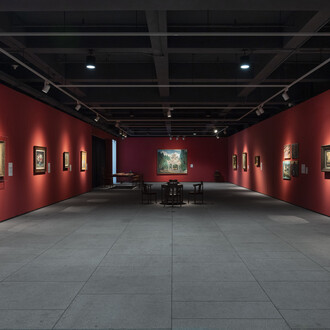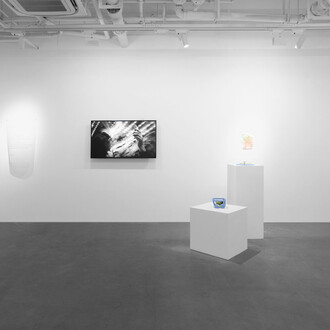From November 7, 2024, to January 5, 2025, the Long Museum West Bund will present Wang Yuyang: Painting, a solo exhibition showcasing the artist's latest works. The exhibition offers a comprehensive overview of Wang's painting practice since 2010.
Wang Yuyang developed his passion for painting at an early age, starting with traditional Chinese painting. He later studied realist oil painting under the guidance of Zheng Yi and was admitted to the High School Affiliated with the Central Academy of Fine Arts to continue his artistic training. During this time, driven by curiosity and youthful rebellion, Wang briefly stepped away from painting to study theater at the Central Academy of Drama. He then began exploring contemporary Chinese art through various mediums, including performance, video, and installation.
In 2015, Wang Yuyang held a major solo exhibition, Tonight, I shall meditate on that which I am, at Long Museum West Bund. The show featured over 30 installation works created over the past decade, spanning all three floors of the museum and offering a comprehensive look at the different stages of his artistic practice. Exhibitions of this scale have been rare at the Long Museum since. While Wang has continued to hold solo exhibitions at museums in China and abroad, much of the work in these shows has built on concepts from his earlier series.
Since 2021, Wang Yuyang has been exploring new conceptual directions. Earlier this year (2024), his solo exhibition Chaosmosis at the Shenzhen Art Museum examined the social landscape shaped by science and technology. The show featured technologies such as artificial intelligence, virtual reality, autonomous driving, robotics, geological exploration, synthetic biology, big data, and the Internet of Things. It examined the interplay between humans, artificial objects, synthetic life, and the natural world, constructing new subjects and narratives that challenge and critique the dominant framework of anthropocentrism.
The exhibition Wang Yuyang: Painting showcases a fresh exploration and reorganization of the artist’s decade-long painting practice. Since 2010, Wang has sought to revisit his passion for painting through the lens of new media. However, past exhibitions have only presented this practice as fragments of his broader artistic endeavors. Much like his work in other mediums, Wang’s approach to painting is fluid, with complex languages and ideas that both deconstruct and subvert traditional painting, resulting in contemporary images that blend the human, non-human, and natural worlds. The themes explored in his works include the deconstruction and representation of light, the extension and layering of time, the creation and destruction of machines, and the thresholds and migrations of artificial nature. In essence, “Wang Yuyang: Painting” reflects the artist’s anxieties and critical reflections on traditional artistic media within the context of a “human-technology-nature” environment, while also conveying his enduring love for painting as an expression rooted in the essence of life.
Heterogeneously profuse and cognitively amorphous, Wang Yuyang’s work eschews the familiar stock of artistic tools, eliciting questions about authorship foreign to the human subject, creativity in favor of another order of ingenuity, and conceptual heresies that collapse the conventions of criticism. His mode of conception and production may be characterized as a form of non-standard art, akin to François Laruelle’s radical estrangement from philosophical traditions in the name of non-philosophy. Set against the backdrop of the intractable feud between humanists claiming the moral high-ground of the Enlightenment and posthumanists desiring for a "parliament of things" (Bruno Latour), Wang Yuyang’s work immediately enters into an ethical contention through an aesthetic rupture that demands a new appellation for art and its pedagogical renewal. It also becomes a prism refracting the current cultural spectrum outside of the topos of contemporary art largely framed by the rhetoric of poststructuralism.
Wang Yuyang# series radicalizes the work already begun in his 2013 solo exhibition Liner which employed computer programs to alternately render artworks through an aleatoric selection of literary texts and to reconstruct meanings and visual forms from the artist’s chance drawings of 0s and 1s. Wang Yuyang# is a much more sophisticated software suite conceived of as the artist’s equal, a technical invention that is capable of an “autonomous taking-effect of futurity” (Brian Massumi), which has effaced the artist per se in the conception of artworks. In Quarterly, Preferable and generated performances, Wang Yuyang# has constructed a paradigm by which intelligence and creativity are no longer a human privilege, breaching the anthropocentric taxonomy of the chain of command.
In reversing a typical creative operation from the human artist to the subservient tool-being of media, Wang Yuyang provides a wealth of stunningly novel approaches to sculpture, painting and performance. In addition, he forces the viewer to think anew about a world in which the perception of the real can no longer be reduced to that of human consciousness alone, a reality wherein the production of knowledge becomes a reciprocal conviviality between the subject and the object. With technogenesis on the horizon, originality carves out a new crescent of the mythology of truth.
(Excerpted from "Wang Yuyang: Tonight I shall meditate upon that which I am?", "The Posthuman as a Condition of Art” by Zhang Ga)
Wang Yuyang (b.1979). He graduated from the Institute of Sci-Tech Art, China Central Academy of Fine Arts, after which he stayed on to teach until now. He lives and works in Beijing at present. Focused on techno-art, his work explores the relationships between technology and art, nature and artificiality, material and immaterial, employing an interdisciplinary and multimedia approach. Wang's portfolio spans various fields such as artificial intelligence, genetic engineering, digital media, and mechanical devices. Utilizing computer programming, algorithmic generation, and data visualization, he creates dynamically changing and interactive art forms. Wang Yuyang's pieces not only reflect a critical examination of technological development but also brim with imaginative visions of the future, often presenting an unpredictable aesthetic challenging viewers' inherent perceptions. As an artist consistently innovating and pushing boundaries, Wang Yuyang has used technology to offer new possibilities to art, expanding the perspectives and expressions of techno-art with significant societal and cultural impact.
Wang Yuyang performed more than 20 artist talks at various institutions including Norwich SCVA Museum (Norwich, 2009), Perth Horse Cross (Perth, 2010), Ullens Centre for Contemporary Art (Beijing, 2011), Royal Academy of Arts (London, 2012), King's College London (London, 2013), TEDxNanjing Annual Conference (Nanjing, 2015), Nam June Paik Art Center (Seoul, 2016), ZKM Karlsruhe Center for Art and Media (Karlsruhe, 2017), Centre Pompidou (Paris, 2019), Ca’ Foscari University of Venice (Venice, 2022), etc.
Wang Yuyang’s two works - #-Quarterly and Untitled 1-snowman are presented at Meta-scape, the 59th Venice Biennale China Pavilion.
















